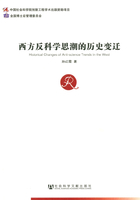
Abstract
Anti-science trend is an important philosophical,cultural and social trend in human history.Anti-science and science trends are generally regarded as two opposite phenomena and categories of history and culture.For a long time,because of its complexities in forms and contents,research about anti-science in China and internationally has been unsystematic and shallow.This book examines“anti-science”,and outlines the historical panorama of the anti-science trend from the pre-scientific period to the end of 20th century.It generalizes its main characteristics in different stages,from the perspectives of intellectual history of science,philosophy of science,scientific culture,science communication,history of religion,history of literature and social history.By drawing on a wide variety of different scholarly disciplines,the book offers ways in which we may systematize and standardize our understanding of anti-science,and integrate scientific culture and humanistic culture,the scientific spirit and the humanistic spirit,scientific value and humanistic value.
In the pre-scientific period,ancient Greek or Roman myths and fables,and Bible stories are apparently against natural knowledge as predecessor of science by the way of metaphor and symbol.Schools of ancient Greek philosophy question and reject theories of natural philosophy from the angles of relativism and skepticism.In the Middle Ages,positions and statements of suspicion and subversion about natural philosophy are everywhere in the books of Patristic theologians.During this period a cognitive paradigm that is antithetical to natural knowledge and as natural philosophy through its opposition to the exploration of nature defends ideas,values and faith.This cognitive paradigm provided the theoretical basis and conceptual framework for the rise of modern anti-science trend.
From the 16th to the 19th century,the first wave of anti-science entered human history with the birth of modern science.Anti-science originated from Romanticism and rose rapidly in academia in western European countries,and became popular.The trend that is pushed by humanists including authors,poets and men of letters denies rational modes and Newtons mechanical methodology,and advocates the epistemology and methodology of subjective intuition and organic holism.In the second half of the 19th century,the anti-science trend of Romanticism was close to the end,and was suspended in the decadent atmosphere of the fin de siècle in the late Victorian period.At the same time,German philosophers,including Nietzsche and others,criticized the fundamental elements of traditional science,such as scientific rationality,truth,scientific methods and scientific objectivity,and built a bridge to modern and post-modern anti-science trend.
From the beginning of the 20th century to the 1960s,humanistic thinkers often expressed an antipathy for scientific rationality because of the crisis of classical science,the negative effects of technology,and the disasters epitomized by World War Ⅰ and World War Ⅱ.They criticized and subverted scientific rationality and objectivity from the perspectives of irrationalism,intuitionism and mysticism,which reflected their general pessimism.Historicist approaches to the philosophy of science challenge the cognitive model of traditional science.Besides,calls for the “Bankruptcy of Science” and for a “Moratorium on Science” grew louder and gave birth to modern anti-science as a form of counterculture.It includes four strong anti-scientific communities:the anti-science of the counterculture movement;the criticism of science by New Romanticism;the recovery of religious and mystical views;and radical environmentalism. They tried to shake the culturally dominant position of science and subvert scientific objectivity and rationality from the perspective of epistemology.
At the end of the 20th century,the intellectual base of academia is under serious attack from postmodernism.Under the accusation of “the End of Science” and agitation of “New Age Movement”,the anti-scientific trend of coming from post-modern deconstructionism springs up in the thoughts of postmodern critical theorists.The trend is pushed to the climax by the “Science Wars” about science and the humanities,under the effects of a “Culture War”.Anti-science trend of post-modern deconstructionism are made up of sociologists of science,feminists and radical ecologists in “Social and Cultural Studies of Science”.They deconstructed scientific epistemology and methodology,from the view of social constructionism and cultural relativism.
The book uses two main research methods.First,it combines of historical and logical methods.Anti-science is examined under a background of western thought and culture,and its main features and logical forms in different periods are tracked.A new perspective is opened up by disclosing laws and mechanism of the development of science and humanity.Second,it combines literature analysis and comparative taxonomy.The book describes historical clues and finds the problems of anti-science dispersed throughout primary and secondary literature.
The significance of this book consists in four points:first,the history of anti-science has not yet been reviewed in a comprehensive and systematic way either in China or internationally. The book attempts to fill this gap.Second,by way of historical exploration,philosophical reflection,and cultural examination,the panorama and features of anti-science in the west are sketched systematically. Anti-science trends in the west continually change its forms and contents in the landscape of science.for example:anti-science trend of Romanticism focuses on criticizing scientific rationality and methodology;anti-science trend of“counterculture”places its emphasis on opposing the dominant position of scientific culture;anti-science trend of postmodern deconstructionism highlights the subversion of scientific epistemology and methodology. Therefore,this book offers a new inductive and comprehensive study of anti-science.Third,tendency of anti-science trends in the west has become stronger than ever,and their influence on the development of human society is deepening and expanding,Which harms the healthy development of science and science communication.We should be on guard and resist its dangers.Lastly,to some extent,research about anti-science trends in the west provides an intellectual reference for understanding and using science,and it offers valuable reference for understanding anti-science phenomenon in China,for finding and understanding a harmonious relationship between people,nature and society from the points of view of ideology and value,and for thinking about sustainable development of human society as a whole.
Key Words:Anti-science Trends in the West;Science;Historical Changes;Features of the Age